I have a confession to make. I have an obsession, maybe even borderline addiction.
It isn’t necessarily an addiction of vice; although I’m sure some people can view it that way.
I think about my addiction constantly – day and night. I don’t keep track of the number of times I think about it during the day but my guess is easily over 10 times a day.
This addiction drives a lot of my decisions.
My addiction is an addiction to numbers.
It is an addiction that started when I was a lot younger. I guess it developed because I’ve always been good with numbers.
It is no wonder I ended up in the financial services industry where numbers and analytical skills are valued.
I spend a lot of my days thinking about a variety of numbers, especially numbers which pertain to my personal financial situation.
I feel a bit like John Nash in the movie A Beautiful Mind with numbers floating all around me all the time.
It is incredibly hard for me to stop thinking about this addiction. There are times I want to stop but seldom was I successful. My mind has a mind of its own at times.
The 11 Numbers I Think About Constantly In My Personal Financial Life
I think about the numbers below constantly. My level of obsession with those numbers has fluctuated with time and changing age.
While the level of obsession with those numbers go up and down with time, they are nevertheless very important for everyone to know and track in order to build a healthy financial life.
Here are 11 numbers I believe everyone needs to know better and to be obsessed about:
#1: Household Net Worth
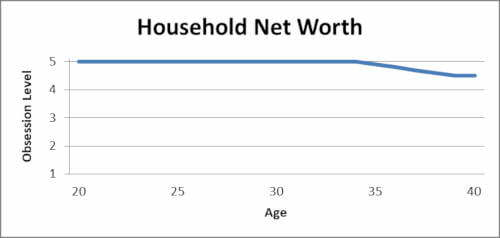
My obsession with my household net worth started right around the time I graduated from college. That was also the time when I started tracking my net worth using Excel.
I had the majority of my net worth in the stock market at the time. My net worth wasn’t too complicated to keep track of. There were one retirement account, one post-tax money trading account, and a bank account to hold my cash.
But I would update my net worth spreadsheet schedule at least once a month. It was useful for me to know how my net worth grew and where I was going.
Then as the years went on, my household net worth became more and more complicated to keep track of. Despite this, I still use a spreadsheet to keep of my net worth.
Maybe I should utilize better software to keep track of my net worth, but it still works for me.
I added real estate to my asset portfolio, first with the purchase of an owner occupied investment property. There are 9 reasons why starting with an owner occupied rental property is a good start in getting your feet wet with rentals.
Then came the addition of the financial assets of my better half. I believe strongly in the benefits of disclosing and discussing finances with your significant other and life partner.
As the years went on, more and more asset types and accounts were added to the net worth equation.
Rental properties were purchased. More trading accounts and retirement accounts were opened. Private equity investments became part of the investment portfolio. Private stocks in my employer were also earned.
529 college savings plan accounts were opened. Limited liability companies were formed to hold some of the real estate investments. More cash accounts were also opened.
The components going into my household net worth have definitely gotten more complicated. But I still update my net worth schedule of all my assets and liabilities at least on a monthly basis.
#2: Projected Future Net Worth
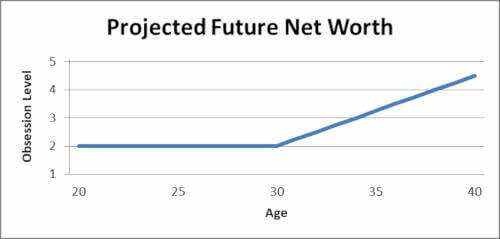
Despite having kept track of my household net worth for about 2 decades now, my obsession with my current net worth has waned a bit in recent years.
The level of obsession of wanting to know my net worth has been replaced recently with a strong interest in projections of my future net worth. I find myself thinking more and more about where my net worth can be in 10, 20, 30, and even in 50 years.
You might think this is crazy for someone to do but I think about my own personal finance situation in terms of years, and at times, decades.
I believe in long term goals for wealth accumulation. Planning in decades allow me to really see the profound effect of my personal finance actions/decisions today.
Allow the power of compound return to take hold.
I have recently been super obsessed with running numbers on what my future net worth can be. This helps me determine how I want to invest my money.
Should I have more of an allocation to rental properties, listed stocks, private equity investments or something else? I can have a clearer picture of the impact of my investment allocation when I look at decades instead of months or even years.
It also helps me in deciding how much money I want to spend. What is the impact of increasing my spending by 10 to 20% a year? Would it even matter to me in 10 or 20 years as a fraction of my future net worth?
#3: Household Income
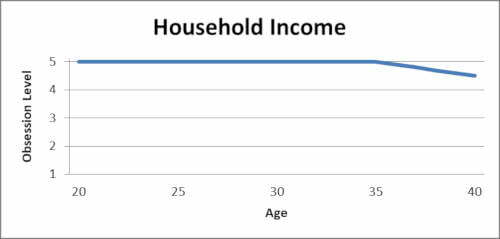
This is a metric I remain focused on as well. But quite frankly, its importance has diminished throughout the years.
When I was younger, I was obsessed with increasing my household income. It isn’t easy living in New York City with a $60,000 per year income – at least not the lifestyle I want for myself.
By my calculation a couple of years ago, it takes $485,000 to live an upper middle class lifestyle and $1,080,000 to live an upper class lifestyle in Manhattan. Although the cash needed has come down this year due to the pandemic, it is still expensive to say the least.
A lot of people get by in the Big Apple on $60,000. The medium income in NYC is approximately $64,000. But I knew I wanted at least an upper middle class lifestyle.
That means my income needed to increase drastically from my early career days. Hence, I had a strong obsession with increasing household income.
After years of climbing the corporate ladder, I currently find myself in a comfortable spot. I make a robust income. Can I make more if I switch companies? Probably. Is it easy to do? I would need to really focus on looking for a better job.
At this point, I don’t have a strong desire to move out of my current job. That means my income becomes more or less stagnant.
Are there special payouts from year to year? Sure, but do I anticipate there to be a big positive change in my income from year to year? I won’t be banking on that.
Nonetheless, I still think about my household income today – but more from the perspective of how much can it add to my future net worth if I remain employed for the next 10 years.
#4: Annual Free Cash Flow
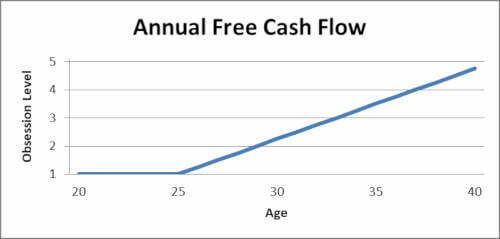
This is the number I am actually more focused on nowadays than my annual household income.
Annual cash flow is how much cash I actually receive in a given year. It is different from income in that it is a post-tax number.
Different income streams throw off different cash flow even if the income stream amount is the same.
For instance, I can collect $400,000 of W-2 income. The income tax rate on that income will be closer to 50% for me with Federal, NYS and NYC income taxes. My cash flow from that income comes out to be around $200,000.
I can earn $400,000 in long term capital gains. Now that income is taxed at around 35% for me. So I get to pocket $260,000.
The best from a tax standpoint is rental income. I can earn $400,000 in rental income and can pocket all of it because of the tax benefits of real estate.
Therefore, the same income can yield very different post-tax cash flow. That is why I’ve been more focused on my cash flow recently as opposed to just income given I have exposure to different asset classes.
#5: Household Expenses
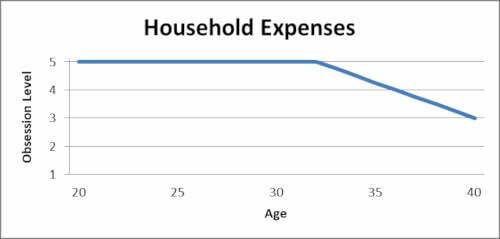
There was a time early on in my life when I used to track my household expenses meticulously. I wanted to know where each dollar went. I would look at each charge on my credit card and agree it back to a receipt I have.
$5.75 spent at the local deli for a coffee and bagel. Let me make sure that agrees back to a receipt.
That was my mindset around household expenses for a good chunk of my early working life.
Now I spend almost no time tracking each charge on my credit card. Sure, I still review my credit card statement. I haven’t completely forgone looking at my charges, but I review the charges for reasonableness.
Do the amounts and charges look legit and correct to me? I no longer agree each charge to a receipt. I also don’t keep track of my annual expenses.
I have some sense of what my annual expenses are. But the number I can give you might be within plus or minus 15% of the actual number.
My household has entered into a place of having consistent expenditures within a band. That is why I don’t spend as much time on the actual expenses. A 15% increase or decrease each year isn’t truly significant to me now at this point.
As long as my net worth is going up nicely and in line with my expectation, I don’t have to hold each expense under a magnifying glass. I didn’t get here over night. It took me years to get here.
#6: Years To Financial Independence
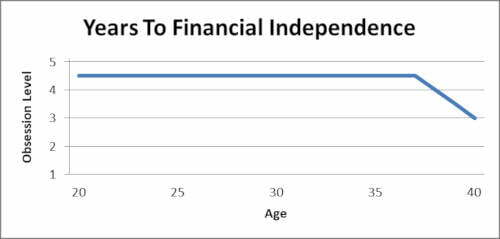
As a personal finance blogger, of course I obsess over my years to financial independence. FIRE (financial independence, retire early) is such a big movement now.
When I was younger, the only reason why I worked so hard was because I wanted to retire at the earliest time possible while still be able to maintain the lifestyle I wanted.
The drive to get the years to financial independence down to the lowest number possible still consumes me today.
I think I am about 2 years away from FI. That is when I think my passive income cash flow equals my household expenses.
Despite being so close to the FI finish line, I am thinking about moving the goal once again. I have moved the goal numerous times as I’ve gotten older. I might move it one more time now if I trade up to a bigger house for my family.
The years to FI is still fun to track but it isn’t as important to me now as it was 2 to 3 years ago.
Therefore, even if I cross the FI finish line one day, I will probably continue to work. Early retirement isn’t really for me. I am more a fan of the Work LITE model (location independence, time enjoyable).
#7: Financial Independence Number
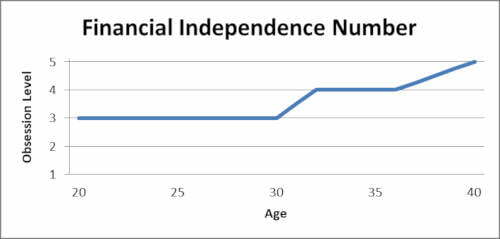
Obviously, I can’t get to years to financial independence without knowing and obsessing over my financial independence number.
I don’t truly look at one big number I need to hit. Instead, my FI number is the annual cash flow number I need to get to in order to maintain a happy lifestyle.
Just like different types of income can produce different cash flow streams, different investments can produce different cash flows.
A $1,000,000 can generate $10,000 or $100,000 in cash flow, depending on one’s level of risk and the level of passivity of the investment.
That is why I am less focused on how much wealth I need to accumulate in order to be FI. I am more focused on how much free cash flow I would need to generate as my FI number.
As many of you know, I am a big fan of rental properties. Given the low interest rate environment, I can get a 10% cash on cash return on my invested capital. The 4% rule (25 times expenses) goes out the door for me.
But I don’t necessarily want all my assets to be invested in rental real estate. I want diversification in my asset base and also want more passive investments going forward.
#8: College Tuition For My Kids
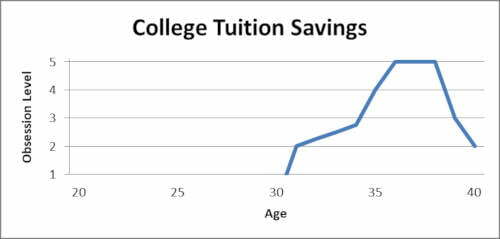
I used to run numbers all day and night to determine how much it will cost to send all 3 of my kids to college.
College tuition has gotten more and more expensive as the years went on. Private universities charge over $70,000 per year for tuition, room and board, and other student fees.
It is a crazy amount right? Now imagine 4 years of that and 3 kids. Plus tuition cost has been increasing at a rate above inflation.
After spending tons of time running numbers on how much it will cost me to send my kids to college and developing a savings plan to get there, I am basically done saving for my kids’ 529 plans at this point.
Now it is up to the stock market to get me to the finish line. Hopefully, the stock market will cooperate.
The interesting thing for me is that with each passing year, I question the need of a formal college education. I think the value of a college education has decreased over the past 10 years despite the schools actually charging more and more for an education.
Nonetheless, I spend very little time nowadays looking at the college savings because in my mind, I am basically done.
If the stock market cooperates, then great, my kids can get a free ride to a private university of their choice (although I don’t intend to cover 100% of the costs, my kids should have some skin in the game).
If the stock market doesn’t perform as well in the next 2 decades as it has done the past 2 decades, then I can supplement with my future cash flow or cover a lower percentage of the total cost.
#9: Retirement Account Balance
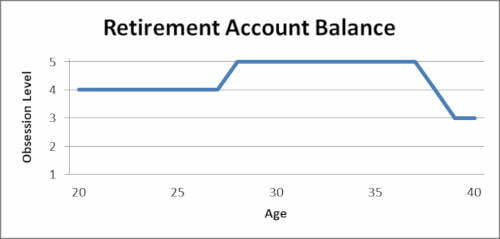
I think I have a robust retirement account balance. In fact, I am able to get to a 7-figure nest egg in my 30’s.
I used to spend more time focused on my retirement account – constantly saving and investing the proceeds.
Nowadays, I spend a lot less time on the actual number and more time on what investments to put the money in.
To me, my retirement account balance is just icing on the cake. If I can reach FI in 2 years, then money I can’t touch until 59 and a half without incurring heavy penalty becomes less important.
If I can sustain a lifestyle I am happy with based on only my passive income, any extra cash will just be used for even more discretionary expenditures.
#10: Investment Returns
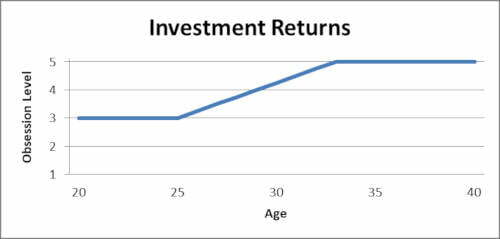
Keeping track of investment returns has increased in importance now than when I was younger.
Of course, investment returns were always important to me but when the asset base is small, the dollar impact of investment return is not that high.
A 1% incremental return on $100,000 results in an extra $1,000. Nothing to scoff at but that amount can only provide for a nice lunch for two once a month.
Now, a 1% incremental return on $10,000,000 results in an extra $100,000. An extra $100,000 per year can pay for a $4,000,000 mortgage with a 2.5% interest-only loan.
What happens if I can work hard to get an incremental 3% of return on my investments? That can translate into an additional $300,000 off of a $10,000,000 investment base.
Wow, that is a big difference in dollar return.
That is why my obsession with my investment returns has increased over time. I anticipate my obsession with this number will only go up from now on.
#11: Passive Cash Flow From Investments
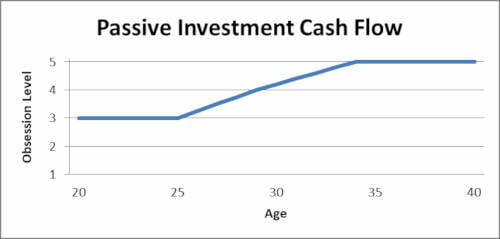
I cannot reach FI without having passive investment cash flow.
The majority of my passive cash flow streams come from rental properties.
Therefore, on a monthly basis I keep track of my rental income and my operating expenses of my rental properties closely.
I keep track of the numbers no different than how I would when running a business. It is important to me to know where I am spending my cash and which renters paid and which renters are delinquent.
Only by keeping track of my rental income cash flow can I come up with my years to financial independence.
This number has grown in importance to me over the years. My net rental income is a significant part of my overall household cash flow and income.
Blog Readership
Not everyone has a blog. Hence, not everyone needs to be obsessed over their blog readership.
But since starting this blog back in 2019 I find myself constantly tracking the number of visitors to my site. After all, I want to write for people.
I check on my Google Analytics numbers a few times a day.
The more visitors the more incentivized I am to keep writing. There is nothing better than a reader referring this blog to someone else.
I want to be the most visited personal finance blog out there. 🙂 Help spread the word!
I don’t know why I am so obsessed with my readership. It has been a slow grind in getting the readership up.
This blog is ranking well with some search engine terms and the majority of the blog’s traffic comes from Google.
Hopefully, the number of readers can continue to go up and in an exponential fashion.
I am definitely obsessed with the number of visitors, page views per day, bounce rate, time on site, and other blog readership metrics.
To the audience: What numbers are you obsessed with today? What numbers were you obsessed with when you were younger but are no longer obsessed with now? What financial metrics have grown in importance to you recently?
Related Posts
Easy Math Trick To Crush Retirement Goals And Why People Have The Wrong View About It
Financial Rant – Americans, We Can Do Better Financially!
A Million Dollar Income ($1,000,000) And A Detailed Analysis Of The Household Budget

Many people work hard to better their physical and mental health. What about their financial health?
I started this blog back in 2019 to help people better their financial health as well.
My financial journey began with tens of thousands in student loan debt. Over the span of 20 years, I am close to achieving financial independence.
I truly believe anyone can get to strong financial health. Hopefully, this blog can help you on your financial journey to greater wealth and financial independence.
You can read more about me here.
Thank you for visiting. Come again soon!

Enjoyed the article, but one thing stood out. Did I read this correctly, a nice lunch for two in NY costs $1,000? I’m on the other coast, but even by Newport Beach standards this seems excessive.
$1,000 can buy a nice lunch for two in NYC once a month for an entire year.